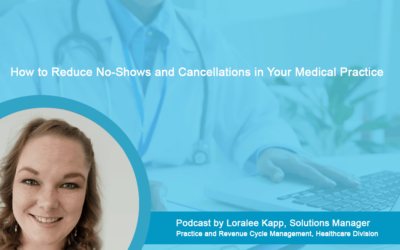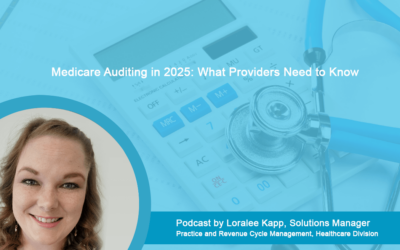Outsource Strategies International (OSI) is an experienced medical billing outsourcing company providing medical billing and coding services for diverse specialties.
In today’s podcast, Loralee Kapp, one of our Solutions Managers discusses type 1 and type 2 diabetes and how partnering with a reliable coding company can help practices with accurate disease reporting, claim submission and prompt reimbursement.
Read Transcript
Hey all, this is Loralee Kapp, Solutions Manager with Managed Outsource Solutions. Today I want to talk to you about type 1 and type 2 diabetes and how utilizing to an outsourcing company such as Managed Outsourced Solutions can help with your prompt reimbursement and coding needs. For a full list of ICD 10 and CPT codes associated with this podcast, please see the attached article.
CPT and ICD-10 codes to report Type 1 Diabetes- and Type 2 Diabetes
82009-84999: Chemistry Procedures
- 82947: The lab analyst performs a test to measure the amount of glucose in a patient’s blood using a method other than a reagent strip.
- 82948: The clinician performs a test to measure the amount of glucose in a patient’s blood using a reagent strip test method.
- 82950: The lab analyst tests a sample, typically blood, for glucose, also known as blood sugar. The collecting provider takes the sample at a set time after the patient has ingested an amount of liquid or a meal with a high glucose content. Clinicians commonly use this to test for diabetes.
- 82951: The lab analyst performs a test to measure the amount of glucose in a patient’s blood at three different times: initially while fasting and two more times, each at a specific time after the patient takes an oral dose of glucose.
- 82952: Following a glucose tolerance test with three specimens, the lab analyst performs an additional test to measure the amount of glucose in the patient’s blood, typically following an additional oral glucose dose.
- 83036: This A1C test measures the amount of sugar sticking to the red blood cells, displaying the result as a percentage. This gives the physician an understanding about the blood sugar level of the patient for the preceding three months.
- 83037: The analyst performs a test using a drop of blood obtained by finger stick or venipuncture from the patient to rapidly measure the level of glycoslylated hemoglobin, HgbA1c. The analyst uses a device the FDA has approved for home use. This test is an indication of glucose control over a three to four month period and results show as a percent of total hemoglobin.
ICD – 10 Codes
Type 1 Diabetes Mellitus
- E10: Type 1 Diabetes Mellitus
- E10.1: Type 1 diabetes mellitus with ketoacidosis
-
-
- E10.10: Type 1 diabetes mellitus with ketoacidosis without coma.
- E10.11: Type 1 diabetes mellitus with ketoacidosis with coma
- E10.2: Type 1 diabetes mellitus with kidney complications.
-
-
-
- E10.21:Type 1 diabetes mellitus with diabetic nephropathy
- E10.22: Type 1 diabetes mellitus with diabetic chronic kidney disease
- E10.29: Type 1 diabetes mellitus with other diabetic kidney complication.
- E10.3: Type 1 diabetes mellitus with ophthalmic complications.
- E10.4: Type 1 diabetes mellitus with neurological complications
- E10.5: Type 1 diabetes mellitus with circulatory complications.
- E10.6: Type 1 diabetes mellitus with other specified complications.
-
Type 2 Diabetes Mellitus
- E11: Type 2 Diabetes Mellitus
-
- E11.0: Type 2 diabetes with hyperosmolarity
-
-
- E11.00: Type 2 diabetes with hyperosmolarity without nonketotic hyperglycemic – hyperosmolar coma
- E11.01: Type 2 diabetes with hypersmolarity with coma.
- E11.1: Type 2 diabetes mellitus with ketoacidosis.
- E11.2: Type 2 diabetes mellitus with kidney complications.
-
-
-
- E11.21: Type 2 diabetes mellitus with diabetic nephropathy
- E11.22: Type 2 diabetes mellitus with diabetic chronic kidney disease.
- E11.29: Type 2 diabetes mellitus with other diabetic kidney complication.
-
00:24 About Diabetes Types
Diabetes is considered as a serious health condition and if it is not managed properly, it can lead to life threatening conditions. Type 2 diabetes is more common than Type 1, but both require constant monitoring of blood sugar levels. In the backdrop of the increasing cases of diabetes, endocrinologists have to attend to a considerable number of patients on a daily basis and correspondingly, endocrinology medical billing has to be managed. As providing the best treatment is the number one objective for doctors, it is important to utilize an outsourcing medical coding service for prompt reimbursement and error free documentation and assure that complexities associated with coding are efficiently dealt with.
01:08 Diagnosing diabetes
In order to diagnose type one and type 2 diabetes, endocrinologists direct patients to undergo the GlycatedHemoglobin test or A1C test to analyze average blood sugar level tests of the past two to three months. As an additional measure, the family history of the patient is thoroughly examined. The patient might be told to take to take a Random Blood Sugar Test or a Fasting Blood Sugar Test, if the A1C test is unavailable or if the patient has some underlying condition that can makean A1C test inaccurate.
As a medical billing and coding company, Managed Outsourced Solutions is here to help endocrinologists extend the quality of their services by taking over their needs of billing and coding, to ensure prompt and accurate reimbursement without claim denials.



